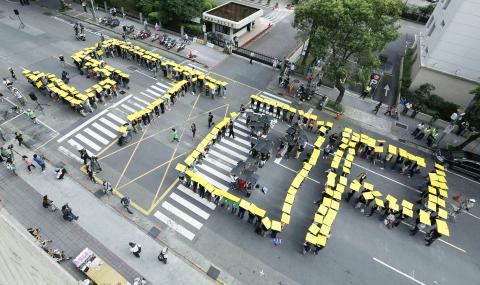About 300 people held up two-sided yellow and black boards to form the English word “Stop” in front of the legislature in Taipei yesterday afternoon to protest against the proposed national referendum on the construction of the Fourth Nuclear Power Plant in Gongliao District (貢寮), New Taipei City (新北市), that is likely go to a second vote this week.
The demonstrators were mainly young people, a few with small children, but some middle-aged people were also present. The protest wasorganized by the National Nuclear Abolition Action Platform, an alliance of several civic groups advocating an end to nuclear power in Taiwan.
Flipping the boards in unison, the demonstrators shouted “Stop” in response to the organizers when they called out: “dangerous nuclear power,” “10,000 years of nuclear waste” and “bird-cage referendum,” to demand that lawmakers put a stop to nuclear power plants.

Photo: Patrick Lin / Reuters
The alliance said that although the nuclear-free marches held on March 9 drew more than 220,000 participants across the nation, they represented only a part of the civic anti-nuclear force, citing several public opinion polls showing that up to 70 percent of the public oppose completing the Foruth Nuclear Power Plant.
However, due to the phrasing of the referendum question proposed by the Chinese Nationalist Party (KMT) and the Referendum Act’s (公民投票法) requiring more than 50 percent of registered voters for a plebiscite to pass, the plant’s completion will be approved if fewer than 9.15 million people vote against it, the alliance said.
The protesters then flipped their boards one at a time to symbolize how “a single spark can start a prairie fire” — one of the main themes of the anti-nuclear movement.
Green Citizen Action Alliance secretary-general Tsuei Su-hsin (崔愫欣) said that although the anti-nuclear groups and individuals may seem insigficant and scattered, the government should not underestimate the collective strength of civil society.
Later, holding a long yellow banner that read “refuse nuclear power, terminate the Fourth Nuclear Power Plant,” the demonstrators encircled the Legislative Yuan as they sang a song by the Labor Exchange Band (交工樂隊) called Nuclear-Free Homeland March.
After the demonstration ended in the evening, an event was held at a stage set up by the Legislative Yuan in which anti-nuclear activists and public figures from various sectors of society spoke on nuclear issues. After the speeches, musicians, including Blackhand Nakashi (黑手那卡西) and Hakka singer-songwriter Lin Sheng-xiang (林生祥), performed to show their support for the cause.

‘DENIAL DEFENSE’: The US would increase its military presence with uncrewed ships, and submarines, while boosting defense in the Indo-Pacific, a Pete Hegseth memo said The US is reorienting its military strategy to focus primarily on deterring a potential Chinese invasion of Taiwan, a memo signed by US Secretary of Defense Pete Hegseth showed. The memo also called on Taiwan to increase its defense spending. The document, known as the “Interim National Defense Strategic Guidance,” was distributed this month and detailed the national defense plans of US President Donald Trump’s administration, an article in the Washington Post said on Saturday. It outlines how the US can prepare for a potential war with China and defend itself from threats in the “near abroad,” including Greenland and the Panama

A wild live dugong was found in Taiwan for the first time in 88 years, after it was accidentally caught by a fisher’s net on Tuesday in Yilan County’s Fenniaolin (粉鳥林). This is the first sighting of the species in Taiwan since 1937, having already been considered “extinct” in the country and considered as “vulnerable” by the International Union for Conservation of Nature. A fisher surnamed Chen (陳) went to Fenniaolin to collect the fish in his netting, but instead caught a 3m long, 500kg dugong. The fisher released the animal back into the wild, not realizing it was an endangered species at

The Chinese Nationalist Party (KMT) is maintaining close ties with Beijing, the Democratic Progressive Party (DPP) said yesterday, hours after a new round of Chinese military drills in the Taiwan Strait began. Political parties in a democracy have a responsibility to be loyal to the nation and defend its sovereignty, DPP spokesman Justin Wu (吳崢) told a news conference in Taipei. His comments came hours after Beijing announced via Chinese state media that the Chinese People’s Liberation Army’s Eastern Theater Command was holding large-scale drills simulating a multi-pronged attack on Taiwan. Contrary to the KMT’s claims that it is staunchly anti-communist, KMT Deputy

The High Prosecutors’ Office yesterday withdrew an appeal against the acquittal of a former bank manager 22 years after his death, marking Taiwan’s first instance of prosecutors rendering posthumous justice to a wrongfully convicted defendant. Chu Ching-en (諸慶恩) — formerly a manager at the Taipei branch of BNP Paribas — was in 1999 accused by Weng Mao-chung (翁茂鍾), then-president of Chia Her Industrial Co, of forging a request for a fixed deposit of US$10 million by I-Hwa Industrial Co, a subsidiary of Chia Her, which was used as collateral. Chu was ruled not guilty in the first trial, but was found guilty